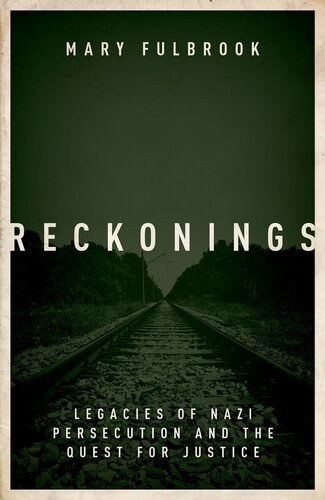

Most ebook files are in PDF format, so you can easily read them using various software such as Foxit Reader or directly on the Google Chrome browser.
Some ebook files are released by publishers in other formats such as .awz, .mobi, .epub, .fb2, etc. You may need to install specific software to read these formats on mobile/PC, such as Calibre.
Please read the tutorial at this link: https://ebookbell.com/faq
We offer FREE conversion to the popular formats you request; however, this may take some time. Therefore, right after payment, please email us, and we will try to provide the service as quickly as possible.
For some exceptional file formats or broken links (if any), please refrain from opening any disputes. Instead, email us first, and we will try to assist within a maximum of 6 hours.
EbookBell Team

4.4
72 reviewsShortlisted for the 2019 Cundill History Prize
From the Holocaust Museum in Washington, D.C. to the "stumbling stones" embedded in Berlin sidewalks, memorials to victims of Nazi violence have proliferated across the globe. More than a million visitors ? as many as killed there during its operation ? now visit Auschwitz each year. There is no shortage of commemoration of Nazi crimes. But has there been justice? Reckonings shows persuasively that there has not. The name "Auschwitz," for example, is often evoked to encapsulate the Holocaust.? Yet focusing on one concentration camp, however horrific the scale of the crimes committed there, does not capture the myriad ways individuals became tangled up on the side of the perpetrators, or the diversity of experiences among their victims. And it can obscure the continuing legacies of Nazi persecution across generations and across continents.
Exploring the lives of individuals across a spectrum of suffering and guilt ? each one capturing one small part of the greater story ? Mary Fulbrook's haunting and powerful book uses "reckoning" in the widest possible sense: to reveal the disparity between the extent of inhumanity and later attempts to interpret and rectify wrongs, as the consequences of violent reverberated through time. From the early brutality of political oppression and anti-Semitic policies, through the "euthanasia" program, to the full devastation of the ghettos and death camps, then moving across the post-war decades of selective confrontation with perpetrators and ever-expanding recognition of victims, Reckonings exposes the disjuncture between official myths about "dealing with the past" and the fact that the vast majority of Nazi perpetrators were never held accountable. In the successor states to the Third Reich ? East Germany, West Germany, and Austria ? prosecution varied widely and selective justice was combined with the reintegration of former Nazis.